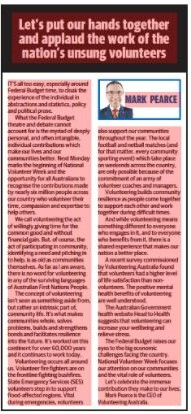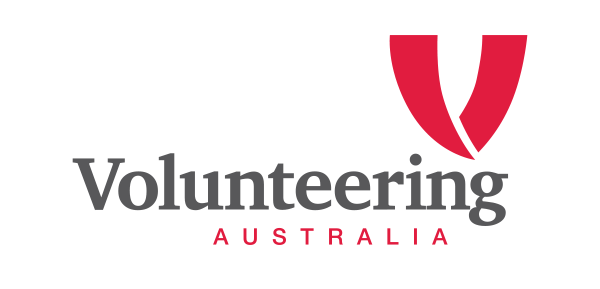Volunteering Australia CEO, Mark Pearce writes about the importance of volunteering in the lead up to National Volunteer Week 2021 in an opinion piece published in The Daily Telegraph, Friday 14 May.
It’s all too easy, especially around Federal Budget time, to cloak the experience of the individual in abstractions and statistics, policy and political prose. What the Federal Budget theatre and debate cannot account for is the myriad of deeply personal, and often intangible, individual contributions which make our lives and our communities better.

Monday 17th May marks the beginning of National Volunteer Week and the opportunity for all Australians to recognise the contributions made by nearly six million people across our country who volunteer their time, compassion, and expertise to help others.
We call the act of willingly giving time for the common good and without financial gain, volunteering. But of course, the act of participating in community, identifying a need and pitching in to help, is as old as communities themselves.
As far as I am aware, there is no word for volunteering in any of the surviving languages of Australian First Nations People. The concept of volunteering isn’t seen as something aside from, but rather an intrinsic part of, community life. It’s what makes communities whole, solves problems, builds and strengthens bonds and facilitates resilience into the future. It’s worked on this continent for over 60,000 years and it continues to work today.
Volunteering occurs all around us. Volunteer fire fighters are on the front-line fighting bushfires. State Emergency Services (SES) volunteers step in to support flood-affected regions. Vital during emergencies, volunteers also support our communities throughout the year.
The local football and netball matches (and for that matter, every community sporting event) which take place on weekends across the country are only possible because of the commitment of an army of volunteer coaches and managers. Community organisations dedicated to the arts, environmental protection, animal welfare, education, disability, and aged care are made possible because of volunteers. Religious, hobby, and interest groups are invariably maintained by volunteers.
Throughout the COVID-19 pandemic, volunteers have supplied emergency food packages and provided much needed emotional and mental health support. Sometimes those volunteers are part of an organisation and sometimes they’re people with no formal connection who just want to engage in their community, to give back, and help those who may be doing it tough.
Volunteering builds community resilience as people come together to support each other and work together during difficult times. And whilst volunteering means something different to everyone who engages in it, and to everyone who benefits from it, there is a shared experience that makes our nation a better place.
A recent survey commissioned by Volunteering Australia found that volunteers had a higher level of life satisfaction than non-volunteers. The positive mental health benefits of volunteering are well understood. In the UK, volunteering is often ‘prescribed’ by GPs to alleviate the symptoms of loneliness and depression. The Australian Government health website Head to Health suggests that volunteering can increase your wellbeing and relieve stress.
The Federal Budget raises our eyes to the big economic challenges facing the country. National Volunteer Week focuses our attention on our communities and the vital role of volunteers. Let’s recognise and celebrate the immense contribution they make to all our lives.


